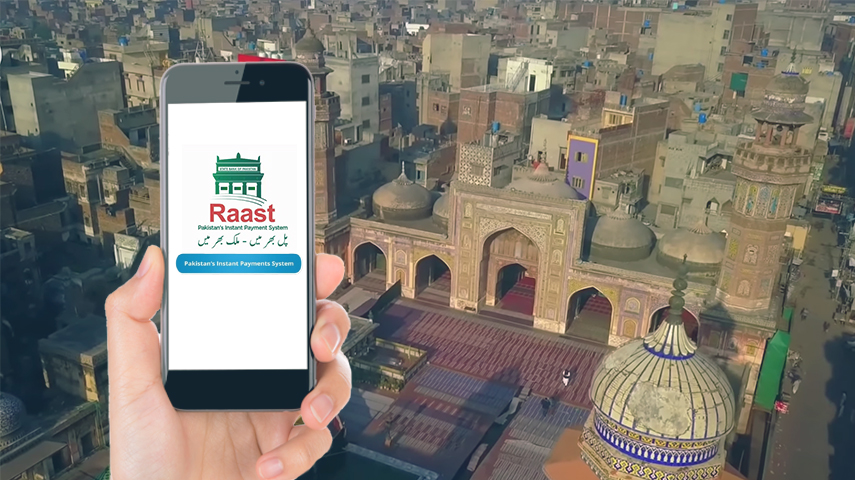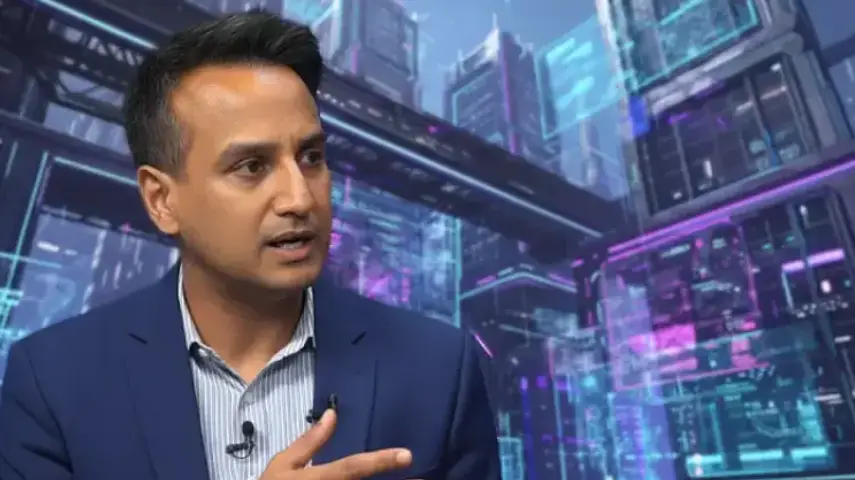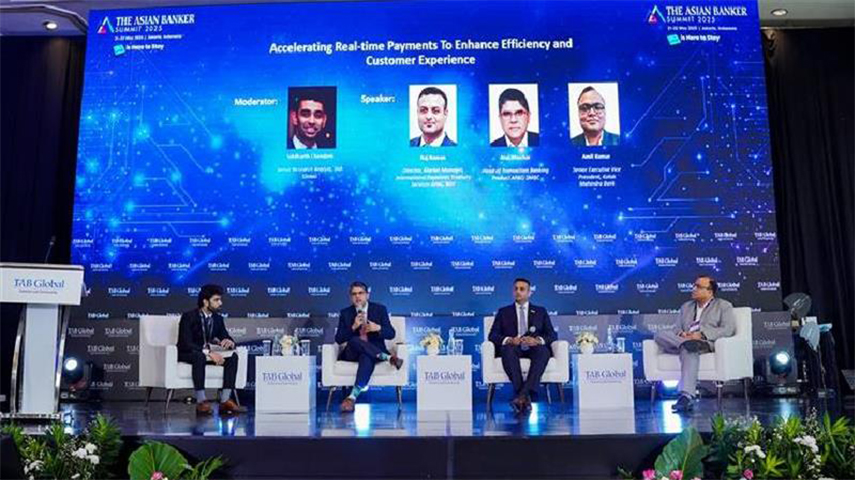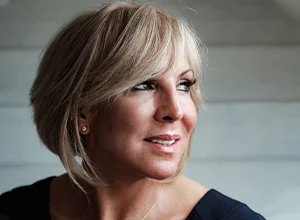- Links state institutions on the platform to facilitate social programmes and enable transparency
- Single infrastructure providing inter-operability to all participants
- Digital and card-based payments struggle to gain traction as consumers remain cash-centric
The mid-January 2021 launch of Raast, a new instant payment system, spearheaded by the State Bank of Pakistan (SBP) and payments gateway, Karandaaz, is aimed at driving financial inclusion and enhancing the country’s existing digital infrastructure. With a three-staged phased roll-out planned and a final launch expected in 2022, Raastor ‘Direct Way’ is positioned as a new link between the government and local financial institutions.
Pakistan is still in its infancy in terms of digitisation of its payment infrastructure that has contributed to its low volume of electronic transactions. With a country whose financial literacy currently stands at 13%, grappling with limited banking penetration and a consumer trust deficit of secure transactions along with associated high payment fees, building a low-cost interoperable platform will present its own challenges.
Raast, however, is well positioned to bridge that gap and it is precisely its low-cost business model that will make digital payments more affordable and attractive to consumers of various socio-economic backgrounds. The payments system is considered an integral part of Pakistan’s National Payment Systems Strategy as well as the National Financial Inclusion Strategy that is seeking to both enable the delivery of financial services digitally and also widen financial inclusion to 50% of the adult population.
Links state institutions on the platform to facilitate social programmes and enable transparency
As per World Bank Global Findex, an estimated 100 million Pakistanis are presently unbanked particularly those in low-income households either lacking access to financial services and/or choosing not to engage in the formal economy. This new platform will provide consumers, merchants, businesses, and government agencies alike to send and receive real-time payments. Pakistan already has payment gateways such 1Link and NIFT deployed but Raast is uniquely positioned in its ability to link the state on its platform. It is envisaged that social funding and aid programmes will also be run through Raast with public sector employees also potentially receiving salaries and pensions.
Some of the broader poverty alleviation schemes such as Ehsaas and Benazir Income Support Programme are also likely to be re-routed through the platform. Indeed, phase one of the rollout is focused on enabling bulk payments followed by consumer-to-consumer transactions and finally culminating with merchant access, all the while powered by real-time gross settlement (RTGS), thereby reducing the reconciliation and settlement process. Essentially, Raast will eclipse the LVPS and PRISM systems operated by the SBP, to focus on large volumes of low-ticket transactions.
As the government seeks to widen its tax base, Raast also provides it an opportunity for greater transparency in revenue generation and combatting corruption through digital documentation. This will also enhance the country’s ability to limit illegal financial transactions and fraud while providing for a secure payment environment.
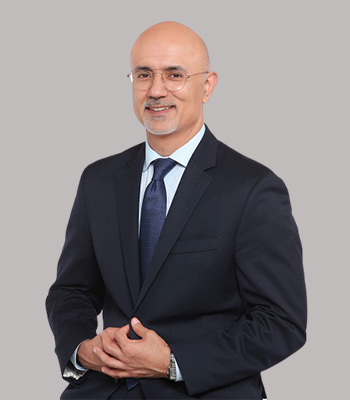
Mudassar Aqil,
CEO of Telenor Microfinance Bank/Easypaisa

Sergi Herrero,
Co-CEO of Veon
Single infrastructure providing inter-operability to all participants
Raast will also allow financial institutions in the country to connect with each other through a single infrastructure. Mudassar Aqil, CEO of Telenor Microfinance Bank/Easypaisa remarked that, “Not only does it aim to successfully cross emotional barriers, but physical ones as well, by offering sector-wide interoperability. Raast is designed to be compatible with all financial institutions and allows them to connect together and make digital transactions possible for customers of any financial institution”.
Sergi Herrero, Co-CEO of Veon, echoed the observation stating that, “Every country needs a strong digital financial backbone that allows as many participants as possible to process transactions between themselves. Typically, this is a switch to which banks, microfinance, payments companies and fintech platforms will connect in a single integration that allows money transfers between all these institutions instantly. Without such an infrastructure opening, these flows are done on a bilateral, non-standardised basis, limiting the ability for everyone to transact”.
This development should have a material impact on the payment preference of Pakistanis as most consumers in the country prefer to use cash to settle transactions even opting for cash on delivery (COD) options when making online purchases. As Ali Imran Khan, head of digital banking at Meezan Bank explained, “We are a cash-based society. If we are bringing a service on a digital channel or mobile, the service should be simple. It should work. It should respond on time and one can depend on it”.
Fundamentally, the prevailing challenges of account-to-account intra-operability among banks will be overcome through the deployment of Raast as existing impediments ranging from fee structure and complicated transfer process make using the existing Inter Bank Fund Transfer system a less appealing option. Raast’s directory function linked to a user’s phone number is designed to shorten the process.
Digital and card-based payments struggle to gain traction as consumers remain cash-centric
Importantly, most banks in Pakistan do not allow online payments through debit cards and those that do make the customer journey onerous. Meezan Bank has deftly moved to overcome this challenge by recently upgrading its own legacy payments platform in collaboration with BPC to strengthen the delivery of payment instruments and offer its customers a more secure e-commerce experience. Other banks are likely to follow suit with enhancing their own digital payment infrastructure capabilities.
The regulator has taken recent steps in making both digital payments and card-based transactions secure with banks being asked to implement a raft of new measures that include exclusive adoption of EMV chip and PIN standard cards for payment in the country, 3-D secure protocol to prevent online transaction fraud and PIN free ‘tap and go’ payments of up to PKR 3000 ($20), to name a few.
The country does have private sector payment initiatives pioneered by local telecommunication companies offering mobile wallets such as Easypaisa and JazzCash that do not require a bank account to get consumers started. Based on SBP data, digital payments account to 0.2% of Pakistan’s 100 billion transactions, while the value of e-commerce payments is only 0.06% of total e-banking transactions (see Figure 1). As Aqil highlighted, “It’s high time we went cashless and made the digital leap forward. Cash is now becoming an inconvenience in many ways, such as when it comes to the full potential of the e-commerce sector, which still faces a number of structural problems caused by the currently cash-friendly economy”.
Real-Time Online Branch (RTOB) transactions in terms of value dominate Pakistan’s e-Banking payment systems infrastructure
Figure 1. Pakistan e-banking transactions by value in Q1 FY2021P

Source: State Bank of Pakistan (SBP) and TAB Research
Similarly, the adoption of contactless payments has been generally slow in Pakistan despite a range of recent initiatives by the central bank which included the provision of a unified standard for quick response (QR) payments while also simplifying the onboarding process of merchants. Merchants themselves are not ready to introduce such type of contactless solutions at their point of sale (POS) terminals but are looking for workable alternatives for low-cost payment acceptance. Shariq Mubeen, head of ADC at Meezan Bank, observed that, “In the last few years we have noticed that there is no inclination of the population towards QR because of the token experience and for now we are focusing on NFC”.
Transition to open banking and platform connectivity in the offing
With existing payment solutions falling short either on siloed approach, difficult user experience or comparatively higher costs, the promise and expectations of what Raast must deliver continue to climb. Raast is expected to have API-based connectivity that will enable banks, fintech players, e-commerce platforms and utility companies to leverage this payment rail. The country’s e-commerce platforms in particular offer significant scope for growth in digital payments. According to the SBP, the Pakistan e-commerce market registered a 78.9% and 33.3% growth in both volume and value, respectively, in 2020 on the back of enforced COVID-19 lockdowns with the current annual market turnover of $220 million.
“If we look at payment ecosystems across the world, to the west we see well-developed banking systems and established players such as PayPal. To the east Tencent and Ant Financial dominate the market. But between those two, there is a whole region with untapped potential where hundreds of millions of underserved customers are demanding better services,” underscored Herrero.
Progressive banks and fintech companies are well positioned to seize the advantages of interoperability and real-time transactions at low costs by introducing innovative financial payment solutions. Herrero pointed out that, “Raast will be a boost to financial inclusion and innovation by allowing everyone to transact and build innovative services on top. This includes digital financial services providers like JazzCash by giving more opportunities for our customers both to use their funds but also to collect money for their personal or professional use”.
Whether Pakistan successfully realises the projected benefits of its National Payment Systems Strategy through a boost in gross domestic product (GDP) by 7%, and with four million new jobs adding $263 billion in new deposits by 2025 as envisaged by the World Bank, remains to be seen. There are additional operational issues concerning the management and execution of the Raast platform that needs to be addressed by relevant stakeholders in the coming months but the potential market-size of $36 billion should be a great motivator for all concerned entities. As Aqil points out, “In the coming years, a switch like Raast will add a lot of value to every organisation and start-up in the country, because payments will be opened up and be frictionless across all bank accounts and mobile wallets. Disbursements, collections, merchant payments, even peer to peer payments will all have a completely new customer journey and be incredibly convenient to execute”.
For a country that has more than 100 million mobile phone users, a new customer journey in digital payments awaits.

